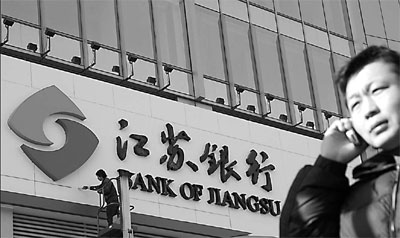Bank of Jiangsu prepares for IPO
By Wang Zhenghua (China Daily)Updated: 2007-07-14 09:08 NANJING: Bank of Jiangsu is expected to secure a foreign strategic partner within the year and has plans to seek a public offering, the local banking regulator said on Friday.
The Nanjing-headquartered bank, the second commercial lender created from the restructuring of 10 city commercial banks in East China's Jiangsu Province, also filed an application to expand its business beyond the province, and is hopeful to open the first outlet outside Jiangsu later this year.
 A Bank of Jiangsu outlet in Nanjing, capital of East China's Jiangsu Province. Wang Yuewu |
Analysts said the bank is an example of how to expand through the merger of small local lenders to fend off increased competition from the big State-controled and foreign banks following the full opening of the financial sector.
Figures released by the Jiangsu office of the China Banking Regulatory Commission (CBRC) on Friday showed that Bank of Jiangsu, opened half a year ago, generated 1.05 billion yuan in profit by June, surging more than 80 percent over the combined profits of the 10 city banks a year earlier.
As of June 30, its total asset value stood at 166.18 billion yuan, up 19.35 billion yuan over the beginning of 2007. The bank has 415 outlets including 10 branches and is preparing to open one more branch in Suqian.
"The bank's strength is enormously enhanced through the consolidation, especially in capital adequacy, management skills and quality of its staff," said Zhou Zhongming, director of the Jiangsu office of the CBRC.
He said the bank is in talks with a number of strategic partners, but declined to name them. "The bank has been in touch with several potential partners even before its opening, and it is expected to finalize its choice within this year."
The strength of State-controled and foreign banks has put increasing pressure on smaller lenders.
"Under the circumstances, struggling small city banks have to find a way out, either by merging with other city commercial banks, securing a strategic partner or having a public listing," said Sun Lijian, an analyst at Fudan University's School of Economics.
|
||
|
||
|
|